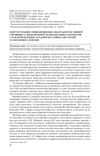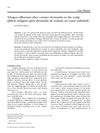 May 2016 in “American Academy of Pediatrics eBooks”
May 2016 in “American Academy of Pediatrics eBooks” Telogen effluvium is a condition that causes temporary hair loss.
 April 2016 in “Journal of The American Academy of Dermatology”
April 2016 in “Journal of The American Academy of Dermatology” A vitamin and mineral supplement significantly reduced hair shedding in Brazilian women with telogen effluvium.
 January 2016 in “International Journal of Medical Research and Health Sciences”
January 2016 in “International Journal of Medical Research and Health Sciences” People with hair loss conditions like Telogen Effluvium and Alopecia Areata often feel scalp pain and are more likely to have anxiety, but not necessarily depression.
December 2015 in “European Journal of Pediatric Dermatology” Newborns can experience temporary hair loss in bands, unrelated to sleeping position.
The document cannot be parsed.

A girl lost her hair due to being given the wrong medication because of a pharmacy's computer error.
 May 2015 in “Journal of The American Academy of Dermatology”
May 2015 in “Journal of The American Academy of Dermatology” Some people may temporarily lose more hair in certain areas after a hair transplant.
 March 2015 in “CRC Press eBooks”
March 2015 in “CRC Press eBooks” Telogen effluvium is a type of hair loss in women caused by many factors, and iron and thyroid tests are recommended for diagnosis.
 January 2015 in “Farmatsevtychnyĭ zhurnal”
January 2015 in “Farmatsevtychnyĭ zhurnal” The tincture made from nettle, sage, and horse chestnut in a 5:3:2 ratio is effective for treating telogen effluvium.
 January 2015 in “Springer eBooks”
January 2015 in “Springer eBooks” Hair shedding that lasts more than 6 months may need medical tests, but often just reassurance is enough.

A woman had temporary hair loss due to stress from a spinal cord injury.
 March 2014 in “Journal of The American Academy of Dermatology”
March 2014 in “Journal of The American Academy of Dermatology” Vitamin D deficiency is common in temporary hair loss, and stress is often a suspected cause.
 January 2014 in “Springer eBooks”
January 2014 in “Springer eBooks” Chronic telogen effluvium is a condition where there is prolonged shedding of hair.
 January 2014 in “Springer eBooks”
January 2014 in “Springer eBooks” The document's conclusion cannot be determined from the provided text.
 January 2014 in “Jaypee Brothers Medical Publishers (P) Ltd. eBooks”
January 2014 in “Jaypee Brothers Medical Publishers (P) Ltd. eBooks” Telogen effluvium is a condition that causes temporary hair loss due to stress or shock to the body.
 January 2014 in “Journal of the Korean Society of Design Culture”
January 2014 in “Journal of the Korean Society of Design Culture” The study confirmed that changes in hair structure in women with hair loss conditions matched what is taught in beauty college trichology courses.
 January 2013 in “Jaypee Brothers Medical Publishers (P) Ltd. eBooks”
January 2013 in “Jaypee Brothers Medical Publishers (P) Ltd. eBooks” Telogen effluvium is a condition that causes temporary hair loss.
 May 2012 in “CRC Press eBooks”
May 2012 in “CRC Press eBooks” Different types of hair loss within Telogen Effluvium are caused by various disruptions in hair growth cycles.
April 2012 in “Informa Healthcare eBooks” Telogen effluvium is a condition that causes temporary hair loss.
 April 2012 in “Informa Healthcare eBooks”
April 2012 in “Informa Healthcare eBooks” Telogen effluvium is a common hair loss condition where many hairs enter the resting phase, often not noticeable until significant loss occurs, and treatment focuses on the underlying cause.
Serum ferritin levels do not cause hair loss in women with telogen effluvium.
 October 2011 in “American Academy of Pediatrics eBooks”
October 2011 in “American Academy of Pediatrics eBooks” The document did not provide specific information on Telogen Effluvium.
 August 2011 in “SpringerReference”
August 2011 in “SpringerReference” Telogen effluvium is a condition that causes temporary hair loss.
 January 2011 in “Medicina interna de México”
January 2011 in “Medicina interna de México” The document concludes that treating the underlying causes of telogen effluvium usually results in hair regrowth.

Hair loss can happen after severe H1N1 flu but usually grows back in 4 months.
 February 2007 in “Independent Nurse”
February 2007 in “Independent Nurse” Different scalp conditions have distinct features and causes.

A patient experienced intense hair loss due to telogen effluvium after scalp contact dermatitis, but hair regrew completely within two months without further treatment.
 October 2005 in “CRC Press eBooks”
October 2005 in “CRC Press eBooks” Telogen effluvium is a condition where hair falls out due to various factors like illness, stress, or nutrient deficiency.
 January 2004 in “Springer eBooks”
January 2004 in “Springer eBooks” Telogen effluvium is a condition that causes temporary hair loss.
 August 2003 in “Journal of Investigative Dermatology Symposium Proceedings”
August 2003 in “Journal of Investigative Dermatology Symposium Proceedings” The document did not provide enough information to summarize the causes of hair loss in pre- and postmenopausal women.


























